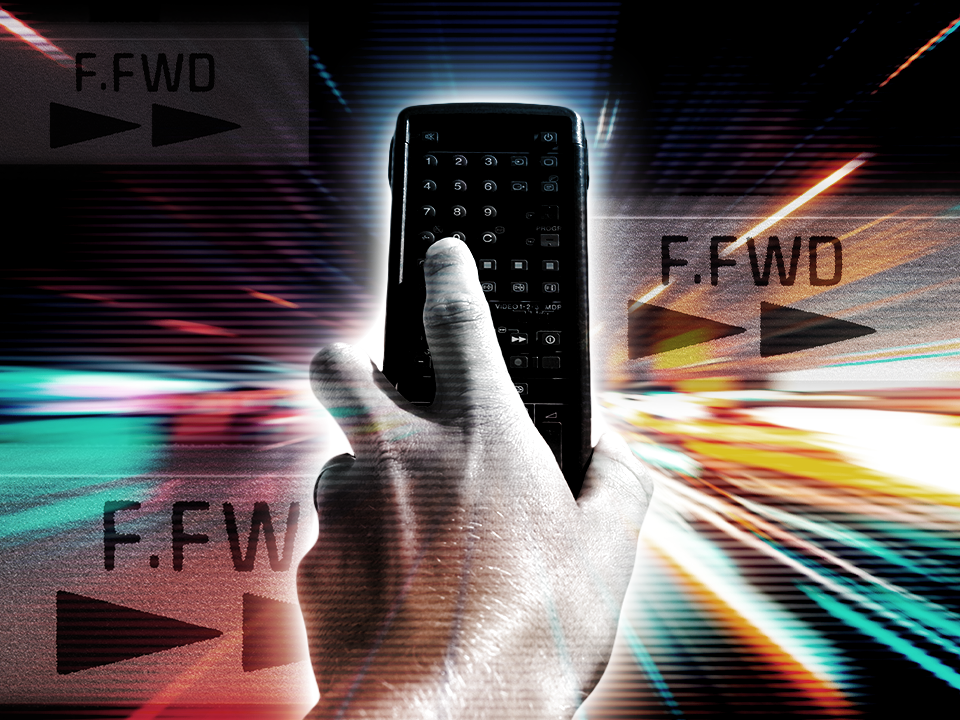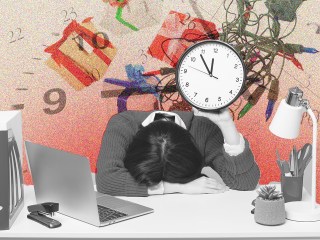14 Ways People Are Navigating the Pandemic Skip
What year is it? How old am I? Where are all of my friends now?
If you woke up on your last birthday (or, honestly, any day) and thought, I’m HOW old?! It’s WHAT year?! Yeah, that's real. Ever since 2020, a lot of us have felt like we seemingly lost chunks of time. Because of that, we felt off-kilter and not entirely our ages as we slowly returned to “normal.” This experience is what a 2023 essay in The Cut perfectly named the “pandemic skip.”
Even if you haven’t used the words “pandemic” and “skip” together, you might know the feeling. One study found that, for thousands of Americans surveyed during the first six months of the pandemic, time felt like it sped up or slowed down—which is common for “an unprecedented collective trauma,” the study’s authors write. And when you have an effed up perception of time and emerge from the confines of lockdown, things are bound to feel out of whack.
Varsha D., 28, says that now that she's on the other side of lockdown, she is incredibly sad about the people we lost and the time we lost too. She finds herself feeling like she’s still 24.
And that feeling makes total sense. When your normal routine changes and you miss experiences that generally indicate time’s passing—like graduations, weddings, baby showers, and holidays—you can absolutely be disoriented, explains licensed clinical psychologist Ryan Howes, PhD. This can happen during any sort of life-derailing setback, like losing someone close to you, getting sick, or (yep!) going through a pandemic, says Dr. Howes.
Dr. Howes says his clients described this pandemic skip as a detour from life because they missed out on the dating scene, jobs, or an in-person education. You might also be a bit confused when arbitrary social norms tell you that, by now, your timeline should look a certain way since you’re somehow older than you feel.
All of this can obviously impact your mood day to day. If you get the sense that the pandemic left you in the dust or unequipped to take on what you used to think of as age-appropriate milestones, you might feel inadequate, insecure, stuck, and/or full of existential dread, explains clinical psychologist Cynthia Shaw, PsyD.
Yes, that’s a lot. But one of the best ways to deal with the pandemic skip is to grieve the experiences and time you lost, Dr. Shaw notes. That's not the only strategy that can help you feel better though. Here, people who’ve dealt with this special brand of mental trickery (or are still dealing with it) explain how they’re managing so you can do the same.
1. Focus on ~happiness~.
“I truly feel like the pandemic took my last year of my 20s and, suddenly, I’m freaking out about my timeline now that I’m 33. Instead of focusing on what I’ve lost or where I should be, I'm trying to make more space for things that bring me joy. That means learning French, planning more travels, meditating, and going to Pilates. It’s been such a helpful perspective shift for me.” —Amy D., 33
2. Think about what you’re grateful for.
“I definitely feel like, at this age, I should be a homeowner by now, but the pandemic rocked the housing market. Here I am, years after lockdown, almost six months pregnant and scrambling to find a place with more space. Mentally, it's been an exhausting journey and the stress seems to be getting worse, not better. The best tool in my toolbox to combat this is gratitude. I'm grateful for my husband, the apartment we have, our cat, and the healthy baby girl growing inside of me.” —Julia G., 32
3. Set personal goals.
“I've stopped comparing my life to others and learned to replace those negative thoughts with direct action and planning. Instead of comparison, I set realistic short-term goals for myself.” —Anonymous, 35
4. Make up for lost fun.
“I was 23 when the pandemic started, and now I’m 28. I feel like I missed my prime 20s-partying era, but I’m too tired to hit the clubs every weekend. I don’t force it, but I remind myself that I can still go out and have fun! In fact, post lockdown, I am more confident, have more money, have better friends, and make better decisions, so my nightlife is actually way more elevated and fun (with less hangovers).” —Kendall F., 28
5. Take back your time.
“My pandemic skip really set in when my boundaries between work and home life went out the window in 2021. Everything moved fast, and I felt like I wasn’t paying attention to time lost until the stress of my job really took over. I was also making excuses for my path in life because I kept saying, ‘I just need to get through X before I can do Y.’ Now more than ever, I understand how important it is to create the life I want for myself in the present instead of putting it off. It’s empowering to take back control of my time, and it feels really good to make progress with creative ideas.” —Char P., 52
6. Remember that timelines are fake.
“I got engaged in 2019 and had planned our wedding for the summer of 2020. Like many others, Covid postponed our plans. Everything felt just out of reach because we had to put things off, like I'd found who I wanted to marry and who I wanted to buy a home with, but we were stuck. Feeling behind took a toll on my self-esteem and made me feel sad. While I did eventually get married, I still sometimes feel like I should have hit more milestones by now, like being further in my career or having a family. Now, whenever I see friends or family members announcing their own milestones, I try to keep reminding myself that timelines are made up, so I'm not actually behind on life.” —Caitlin U., 31
7. Lean into self-compassion.
“Entering a new decade is always a milestone, though I never imagined that I would be entering my 30s while living at home, without a job, in a worldwide lockdown. I'm now 33, but I feel like I'm still 30 because I missed out on trips and life experiences during the pandemic. So, in moments when I’m most hard on myself, I try to give myself grace by being kind to myself. That looks like going on solo dates, doing stuff that makes me happy, or writing down one positive thing that happened to me that day—like not hitting any traffic.” —N.C., 33
8. Shift your focus.
“I started my undergrad studies in mid-2019, so I only had about one on-site semester before everything went completely online until 2022. I didn’t have the typical university experience. What helps me feel less behind now is focusing on the good outcomes, like how I appreciated taking online exams instead of taking them in person and how social distancing actually helped my anxiety and made me feel safer.” —Alessa D., 25
9. Get back into a routine.
“I think those of us who experience the pandemic skip have felt anxiety and fear that time got away from us. It’s like this train that's running and we’re missing the train. There's been a lot of adjusting and getting used to what life looks like now, but having a few things I do consistently, as a creature of habit, helps ground me. My Friday get-togethers with friends remind me that I'm not actually missing out. I also journal, exercise, and go to therapy regularly.” —Ryan Howes, PhD, clinical psychologist
10. Find happiness where you are.
“I see a lot of my friends getting engaged and married, and I feel pressure to follow suit because I’m now 28. Even though I know that I want to get married to my boyfriend, I don’t feel old enough yet, especially because the pandemic slowed down our plans to move in together. One way I’m mentally dealing with it is recognizing that everyone is at their own phase in life and age is just a number. I don’t have to be where everyone else is at as long as I’m happy with where I’m at.” —Kendall F., 28
11. Live intentionally.
“It's easy to resonate with many of my younger clients who also felt they missed out on some major milestones like graduation. Due to the pandemic, my grad school graduation was remote, and so there was no formal hooding ceremony or group celebration with the people I'd spent five years of training with. I think what's helped me the most is taking advantage of the time that I have now by doing what’s important to me. Connecting with the people I love, putting out good energy into the world, taking care of myself, and engaging in meaningful work all contribute to that.” —Cynthia Shaw, PsyD, clinical psychologist and certified grief professional
12. Find comfort in solitude.
“I feel like the pandemic made me lose precious time and set me back a few years when it comes to reaching my goals. Though I’m happy I went back to grad school at the beginning of Covid, I don’t own a home, I don’t have the savings I want, and I don’t have a partner—which makes me still feel sad and lonely sometimes. I also feel a little panicked that I’m now almost 43 and am no closer to being in a relationship. Even though I’m staying positive about meeting someone, I’m trying to be comfortable spending time alone. So, when I’m by myself, I do creative hobbies I enjoy, like writing, painting, sewing, and knitting.” —Sonya S., 42
13. Have patience for your path.
“I was in my mid-20s during the pandemic, and I felt like I lost that time of my life where I could meet new friends, find myself and what my interests were, and enjoy being single. Now, my friends are getting married and buying houses, and I feel left behind. It makes me sad that I lost that time and that I’m not where I want to be today. Though I’m still feeling all of this, I try to keep in mind that everyone’s path is different. I may not be in the same place as my peers, but that doesn't mean those things won't happen for me.” —Brit K., 29
14. Remember you aren’t the only one who feels this way.
“I try to remind myself that the height of the pandemic really was a crisis state unlike anything we’ve ever experienced, so it’s normal that, during that time, I couldn’t do things I would have normally done. A lot of us, on a global scale, went through the pandemic and the pandemic skip. I’m not alone.” —Alessa D., 25
Quotes have been edited and condensed for length and clarity.
Wondermind does not provide medical advice, diagnosis, or treatment. Any information published on this website or by this brand is not intended as a replacement for medical advice. Always consult a qualified health or mental health professional with any questions or concerns about your mental health.




